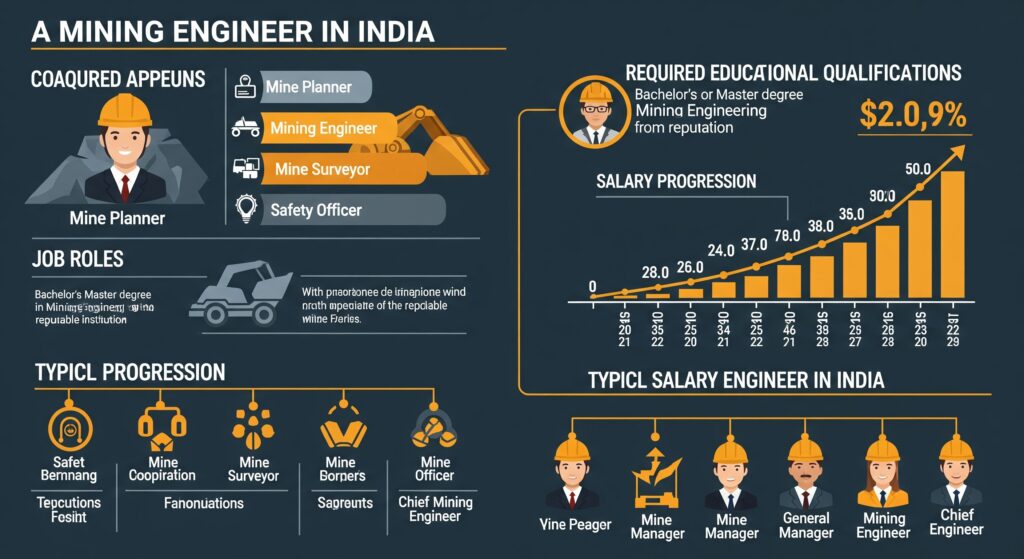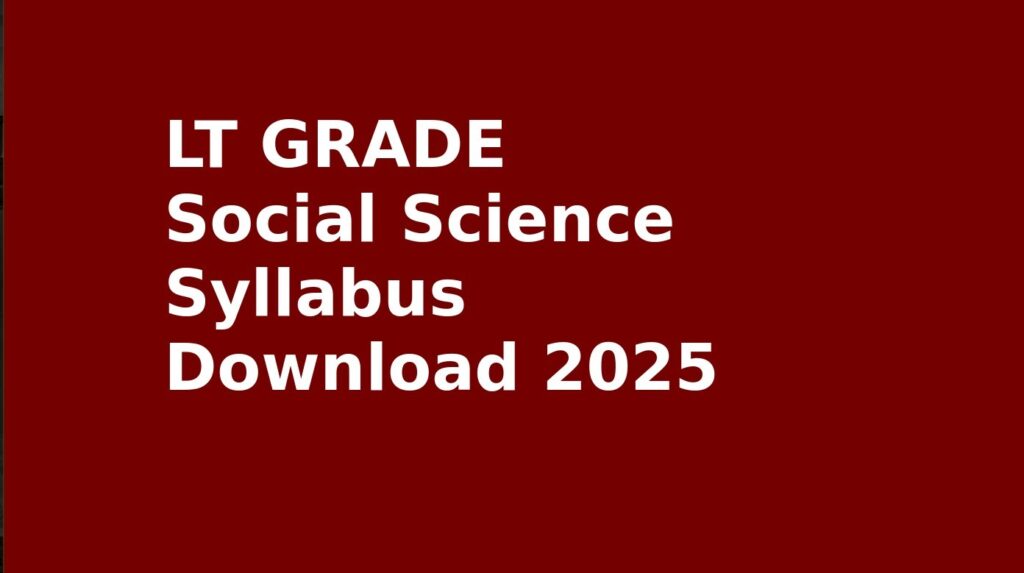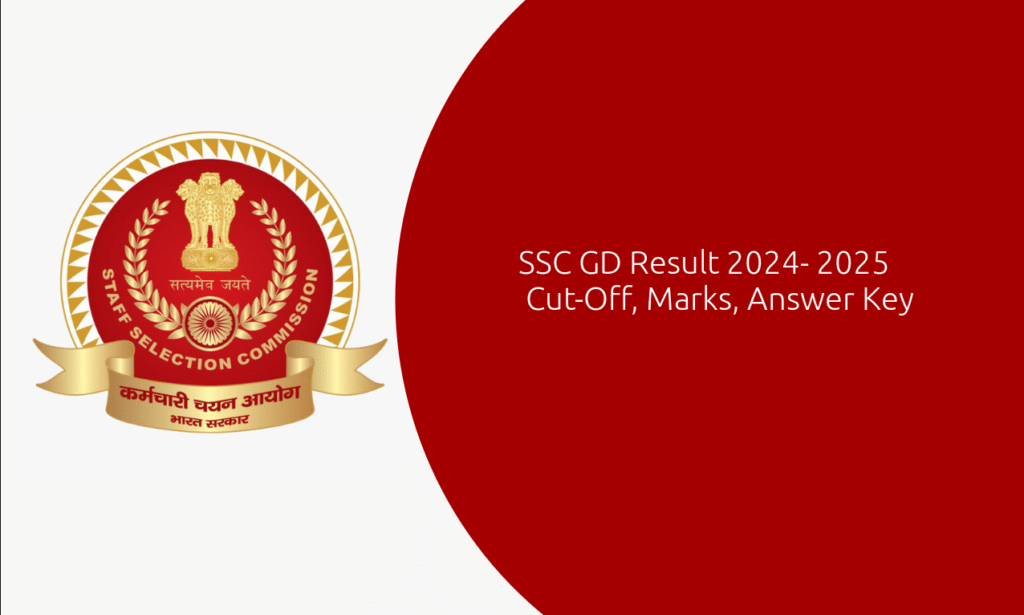Mining engineering, often perceived as a traditional field, is, in fact, at the forefront of innovation, sustainability, and technological advancement. As the backbone of numerous industries, from infrastructure to electronics, mining engineers play a crucial role in extracting the raw materials that power our modern world. If you’re a problem-solver with an interest in geology, technology, and large-scale operations, a career in mining engineering in India might be your calling.
What is Mining Engineering?
Mining engineering is a specialized discipline that focuses on the discovery, extraction, and processing of minerals from the earth. It encompasses a wide range of activities, from the initial exploration and feasibility studies of a mineral deposit to the design, construction, operation, and eventual closure and reclamation of mines.
Career in Mining Engineering in India, Salary, Post

A mining engineer’s work involves:
- Geological Assessment: Understanding rock formations and mineral deposits.
- Mine Design and Planning: Creating safe and efficient mine layouts, whether open-pit or underground.
- Operations Management: Overseeing daily mining activities, equipment, and personnel.
- Safety and Environmental Management: Ensuring compliance with strict safety regulations and implementing sustainable mining practices to minimize environmental impact.
- Mineral Processing: Developing methods to extract valuable minerals from ore.
- Technological Integration: Utilizing advanced software, automation, and robotics in mining operations.
Education and Eligibility: Your Path to a Mining Engineering Degree
To embark on a career in mining engineering in India, a strong foundation in science and mathematics is essential. Here’s a breakdown of the typical educational paths and eligibility criteria:
1. Undergraduate (B.Tech/B.E. in Mining Engineering):
- Eligibility: You must have passed Class 12 (or equivalent) with Physics, Chemistry, and Mathematics (PCM) as compulsory subjects, usually with a minimum aggregate of 50-60% marks (this can be higher for top institutions like IITs).
- Admission Process: Admission is primarily based on entrance examinations.
- National Level: JEE Main and JEE Advanced (for IITs and NITs) are the most prominent.
- State Level: Various state-level engineering entrance exams (e.g., TS EAMCET, KCET) are conducted for admission to colleges within those states.
- University Specific: Some private universities may conduct their own entrance exams.
- Course Duration: Typically 4 years.
2. Diploma in Mining Engineering:
- Eligibility: Passed Class 10 with Science.
- Admission Process: Usually through state-level polytechnic entrance exams.
- Course Duration: Typically 3 years. A diploma can also provide a lateral entry route to the second year of a B.Tech program.
3. Postgraduate (M.Tech/M.E. in Mining Engineering):
- Eligibility: A Bachelor’s degree in Mining Engineering or a related field, with a minimum of 55% marks.
- Admission Process: Often through the Graduate Aptitude Test in Engineering (GATE) scores.
- Course Duration: Typically 2 years.
4. Doctoral (Ph.D. in Mining Engineering):
- Eligibility: A Master’s degree in Mining Engineering or a related field with at least 55% marks.
- Admission Process: Entrance exams and/or research proposals.
- Course Duration: 3-6 years.
Top Institutions in India for Mining Engineering: Several prestigious institutions offer excellent mining engineering programs, including:
- Indian Institute of Technology (Indian School of Mines), Dhanbad
- IIT Kharagpur
- IIT (BHU) Varanasi
- National Institute of Technology (NIT) Rourkela
- NIT Surathkal
- Visvesvaraya National Institute of Technology (VNIT), Nagpur
- Indian Institute of Engineering Science and Technology (IIEST), Shibpur
Salary and Career Prospects in Mining Engineering
The salary for mining engineers in India is competitive and generally increases significantly with experience, specialization, and the type of employer.
- Average Salary: While entry-level salaries might start around ₹3.5 – 6 lakhs per annum, experienced mining engineers can earn substantially more. Recent data suggests an average salary of ₹21 lakhs per annum, with top professionals earning up to ₹50 lakhs per annum or even higher.
- Factors Affecting Salary:
- Experience: As in any field, experience plays a crucial role.
- Specialization: Niche areas like mine safety, rock mechanics, or specific mineral processing might command higher salaries.
- Employer: Public Sector Undertakings (PSUs) like Coal India Limited (CIL), NMDC, and others often offer attractive packages and benefits. Private companies (e.g., Vedanta, Tata Steel) also offer competitive salaries.
- Location: Salaries can vary depending on the location of the mine or corporate office.
Ranks and Career Progression
The career progression in mining engineering in India offers clear pathways for growth and leadership. Starting as an entry-level engineer, you can ascend to senior management and leadership roles.
Typical career path and ranks might include:
- Graduate Trainee / Junior Engineer: Entry-level roles, assisting senior engineers in various operations.
- Mining Engineer / Mine Planner: Involved in designing mine layouts, production scheduling, and technical analysis.
- Assistant Manager / Deputy Manager (Mines): Taking on more responsibility for specific mine sections or projects.
- Mine Manager: A highly responsible position, overseeing the entire mine’s operations, safety, and compliance. This role often requires specific competency certificates issued by the Directorate General of Mines Safety (DGMS).
- Senior Manager / General Manager (Mines): Overseeing multiple mining operations or strategic planning at a higher level.
- Head of Department (HOD – Mines) / Vice President (Operations): Top leadership roles responsible for the overall mining division or company operations.
Beyond core mining operations, mining engineers can also diversify into roles such as:
- Mine Safety Officer: Focusing exclusively on ensuring safety protocols.
- Mine Surveyor: Mapping and surveying mine sites.
- Mineral Processing Engineer: Working on the extraction and refinement of minerals.
- Environmental Consultant: Ensuring sustainable and environmentally compliant mining practices.
- Research & Development: Innovating new mining technologies and methods.
- Academia: Teaching and research at universities.
- Consultancy: Providing expert advice to mining companies.
The Future of Mining Engineering
The mining industry is undergoing a significant transformation driven by technology and sustainability demands. The future of mining engineering is exciting, characterized by:
- Automation and Robotics: Increased use of autonomous vehicles, drilling machines, and remote-controlled equipment for enhanced safety and efficiency.
- Digitalization and Data Analytics: Leveraging big data, AI, and machine learning for predictive maintenance, optimized operations, and geological modeling.
- Sustainable Mining Practices: A growing emphasis on environmentally friendly extraction methods, waste management, water conservation, and mine reclamation.
- Critical Minerals: The rising demand for critical minerals (e.g., lithium, cobalt, rare earth elements) vital for electric vehicles, renewable energy, and high-tech industries.
- Health and Safety Innovations: Continuous advancements in safety technologies and protocols to create safer working environments.
A career in mining engineering in India offers stability, diverse challenges, and the opportunity to contribute significantly to the nation’s economic growth and technological progress. It’s a field for those ready to embrace innovation and lead the charge in responsible resource extraction.
Rajasthan High Court Class IV Peon Online Form 2025: Apply for 5670 Posts!
Disclaimer: The information on this website is for educational and informational purposes only. We are not affiliated with any government organization, and we do not guarantee the accuracy or completeness of the content. Please verify any details regarding exams, courses, or careers with official sources before taking action.







